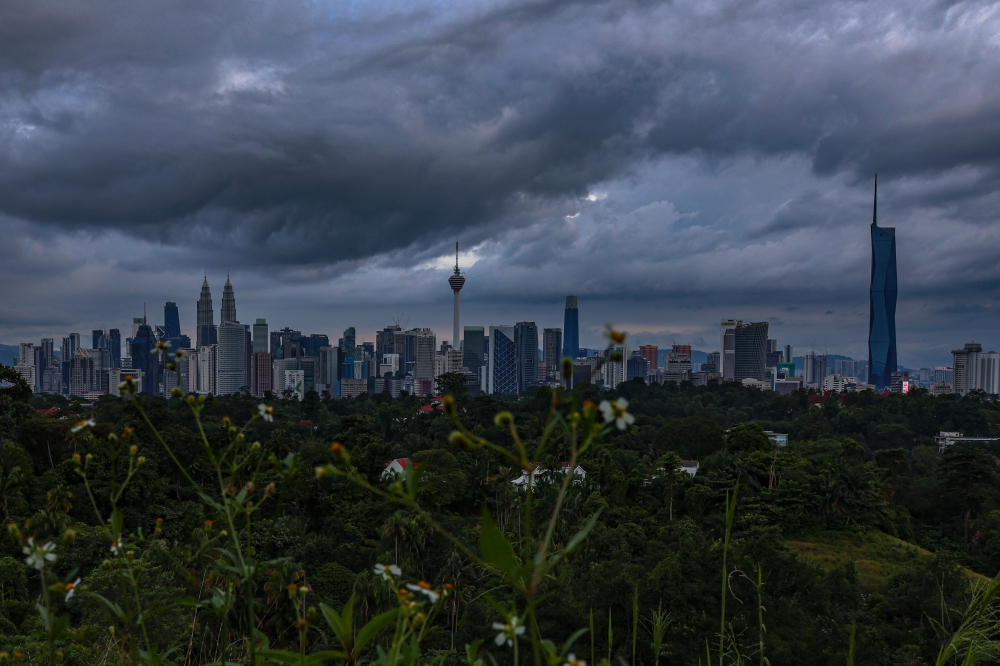KUALA LUMPUR, Feb 5 — A Malaysian woman who was born to a Muslim man and a Buddhist woman out of wedlock finally won her five-year-long legal battle to be declared a non-Muslim, after a majority of the judges decided that the facts showed both she and her mother were never Muslims.
A nine-judge panel at the Federal Court headed by Chief Justice Tun Tengku Maimun Tuan Mat unanimously decided that 39-year-old Selangor resident Rosliza Ibrahim had won her appeal.
As part of the decision, Tengku Maimun and six other judges on the panel decided that the court will grant all the court orders sought by Rosliza, after having decided that the evidence showed that she was born illegitimate and that the facts do not show her as being a Muslim.
The three court orders sought by Rosliza include a declaration that she is illegitimate and that the late Buddhist woman Yap Ah Mooi is her mother, as well as a declaration that she is not a person professing the religion of Islam and that all Selangor state laws for Muslims do not apply to her and that Selangor Shariah courts do not have jurisdiction over her.
She had also wanted a court declaration that the putative father of an illegitimate child does not fall under the definition of “parents” in the interpretation of “Muslim” in Section 2(b) of the Administration of the Religion of Islam (State of Selangor) Enactment 2003. Under Section 2(b), a person — who had either a parent or both parents being Muslim at the time of the person’s birth — will be considered to be a Muslim.
The six other judges who agreed with Tengku Maimun are President of Court of Appeal Tan Sri Rohana Yusuf, and Federal Court judges Datuk Nallini Pathmanathan, Datuk Abdul Rahman Sebli, Datuk Zabariah Mohd Yusof, Datuk Mary Lim Thiam Suan and Datuk Rhodzariah Bujang.
Two judges on the panel, Chief Judge of Malaya Tan Sri Azahar Mohamed and Datuk Seri Hasnah Mohammed Hashim, both allowed the appeal, but differed slightly in not granting two of the court orders sought by Rosliza.
“An order is granted in terms of prayer one, namely a declaration that the appellant is an illegitimate person and that one Yap Ah Mooi, a Buddhist is her natural mother. However, as I do not have the benefit of the opinion of the Fatwa Committee, it is with deep regret that I am unable to make any order in respect of prayers (ii) and (iii) sought by the appellant,” Azahar said when reading out a summary of his judgement, which was agreed to by Hasnah.
In other words, both Azahar and Hasnah refrained from granting these two orders sought by Rosliza — declaration of non-Muslim status and the declaration that the putative father of an illegitimate child does not fall within the definition of “parents” used in the Selangor law to define whether a person is Muslim or not.
Rosliza had started her legal bid back in 2015 with a lawsuit filed via an originating summons in the High Court to have official recognition that she is actually not a Muslim, with the respondents in her lawsuit being the Selangor state government and the Selangor Islamic Religious Council (Mais) which had subsequently intervened and in April 2017 became a party to the case.
Previously at the High Court, Rosliza had shown proof that the Islamic religious authorities of the Federal Territories and 11 states (Selangor, Johor, Kedah, Kelantan, Melaka, Negri Sembilan, Pahang, Penang, Perak, Perlis and Terengganu) do not have any records of her mother converting to Islam or of her biological parents entering into a Muslim marriage, as well as provided the court with her late mother’s October 8, 2008 statutory declaration of not being married to Rosliza’s father when she was born.
Both the High Court and the Court of Appeal had previously in June 2017 and April 2018 respectively ruled against Rosliza, which led to her appeal involving two legal questions before the Federal Court.
Two questions of law were posed before the Federal Court, including whether the High Court has exclusive jurisdiction to hear and decide on a matter if it is about “whether a person is or is not a Muslim under the law” rather than “whether a person is no longer a Muslim”, based on the Federal Constitution.
The second question was whether the contents of a written application for an identity card can be considered as proven facts when the truth of the contents had not been proven by affidavit or at trial, in light of Regulation 24(1) of the National Registration Regulations 1990 — which places the burden of proving the truth of the contents of a written application for an identity card on the person alleging the truth of such contents.
The appeal was heard at the Federal Court on December 16, 2020, where both the Selangor government and Mais objected to Rosliza’s appeal.
What the Federal Court decided
The Federal Court delivered its decision today to all those involved in the case through video-conferencing via Zoom.
In reading out the summary of her judgment in favour of Rosliza that was agreed by six other Federal Court judges, Tengku Maimun went through the facts and evidence presented in Rosliza’s case.
In examining the second question of law, Tengku Maimun listed the three related issues that would arise, including whether Rosliza’s mother Yap and father Ibrahim Hassan were married to each other when she was born.
While the separate written applications of both Ibrahim and Yap in January 1995 and February 1995 for new identity cards for themselves had stated their marital status to be married instead of single, Tengku Maimun noted that both Regulation 24(1) and the Evidence Act’s Section 103 would put the burden on the Selangor government and Mais to prove that the “married” status in the applications were true.
Noting that Rosliza had in a statutory declaration said her parents were not married when she was born and that Yap had in the 2008 statutory declaration also said both she and Ibrahim were not married when Rosliza was born, the judge noted that letters from the Islamic religious authorities had also said they were unable to find any records of a marriage between Rosliza’s parents.
“The evidence, when strung together, sufficiently casts doubt on the existence of Ibrahim and Yap Ah Mooi’s purported marriage.
“In terms of actual proof, the defendants cannot in their respective records locate any proof of the marriage. Neither is there a single affidavit from Ibrahim or from any other relevant person to contradict the plaintiff’s (Rosliza) case,” the judge said, noting that the more logical conclusion in such a situation is to believe that the alleged marriage was non-existent.
As for the second related question of whether Rosliza’s mother Yap is a Muslim or Malay, Tengku Maimun noted Rosliza’s statutory declaration said her mother is a Buddhist, and an affidavit by a neighbour also said Yap is a Buddhist, as well as Islamic religious authorities of Kuala Lumpur and 11 states admitting to have no records of Yap having converted to Islam, concluding that such evidence collectively showed that there was no proof that Yap was a Muslim at the time of Rosliza’s birth.
The judge noted that Yap had in her 1995 application for an identity card claimed she was a Chinese Buddhist, noting that this meant Yap considered herself a Buddhist in 1995 and in 2008 when she affirmed her statutory declaration.
As for Ibrahim’s claim that Yap was a Malay — which under the Federal Constitution’s Article 160 is defined as a person who professes the religion of Islam and habitually speaks the Malay language and conforming to the Malay custom, the judge noted that this was in doubt as Yap’s statutory declaration was translated into Malay from Cantonese.
Tengku Maimun also noted that Yap had in her 1995 application for her own identity card said she was Chinese, and that both Rosliza’s birth certificate and Yap’s death certificate lists Yap as Chinese, and that Rosliza had in her statutory declaration said her mother is Chinese.
“The High Court appeared to believe Ibrahim’s written application for the plaintiff’s identity card where he stated Yap Ah Mooi is Malay. Given the consistency of the record of Yap Ah Mooi’s descent as Chinese, this single entry by Ibrahim is an anomaly,” Tengku Maimun said, adding that Rosliza’s evidence is more consistent and that the facts and circumstances on a balance of probabilities suggest that Yap was neither a Muslim nor a Malay.
With no evidence that Yap was a Muslim when Rosliza was born, the judge said this meant that Rosliza cannot be said to be legally a Muslim by claiming that both her parents were Muslims when she was born.
While the High Court and Court of Appeal had decided against Rosliza by ruling that Rosliza’s parents were validly married and that she inherits her Muslim father’s religious identity as she is a legitimate child, Tengku Maimun however said that Ibrahim could not ascribe his paternity to Rosliza via Section 111 of the Islamic Family Law (State of Selangor) Enactment 2003 as she was born illegitimate. This would mean Rosliza would not inherit her father’s Muslim identity.
Citing the Federal Court’s decision in the case of M. Indira Gandhi where the Hindu mother successfully challenged her Muslim convert ex-husband’s unilateral conversion of their children to Islam, Tengku Maimun said that this meant Ibrahim similarly could not under secular law have the right to unilaterally decide the religion for his then infant daughter as he did in his 1994 written application for Rosliza’s identity card. Rosliza’s identity card currently bears the word “Islam”.
“There is no evidence that Yap Ah Mooi jointly consented to recognise the plaintiff as a Muslim,” the judge said, noting that the evidence instead showed that Rosliza’s birth certificate states “Maklumat Tidak Diperolehi” or information not obtained for the column for the child’s religion.
In the 1994 written application for Rosliza’s identity card which was submitted by Ibrahim, Ibrahim said Rosliza’s religion is “Islam” and said Yap is a Malay.
With this, Tengku Maimun said the answer for the second question of law is negative, which means that the contents of a written application for an identity card cannot be considered as proven facts when the truth of the contents had not been proven by affidavit or at trial.
Rosliza’s lawyers had previously in court documents argued that the application form for Rosliza’s identity card cannot be considered as proof of her actual religion as it was allegedly riddled with conflicting details and inconsistent handwritings.
In answering the first question of law, Tengku Maimun said the High Court has exclusive jurisdiction to hear and decide on a matter if it is about “whether a person is or is not a Muslim under the law” rather than “whether a person is no longer a Muslim”, based on the Federal Constitution.
Tengku Maimun also said the facts showed that Rosliza’s case was not a case about a Muslim wanting to renounce Islam or be recognised as no longer a Muslim, but was a case about a person who was not a Muslim in the first place.
Besides examining Section 2(b) of the Administration of the Religion of Islam (State of Selangor) Enactment 2003 to determine whether Rosliza would be considered a Muslim under the law, Tengku Maimun also examined all five other situations listed in Section 2 of the Selangor state law for a person to be defined as a Muslim, before concluding that the facts showed that none of those situations apply to Rosliza. This means that Rosliza is not considered a Muslim.
Among the facts listed by the judge were that there was “no proof” that Rosliza was ever a Muslim, and that Rosliza’s statutory declaration states that she was never a Muslim and was raised a Buddhist by her mother, and Yap’s statutory declaration stating she had never raised Rosliza as a Muslim, and their neighbour’s affidavit that she had always known Rosliza to be a Buddhist.
“Further, we have the independent evidence in the religious authorities’ letters where they found no record of conversion of either the plaintiff or her mother to Islam,” the judge said, also highlighting again that Rosliza’s religion in her birth certificate was stated as “Maklumat Tidak Diperolehi” or information not obtained.
While the same address was given in the written applications for Rosliza, Ibrahim and Yap in 1994 and 1995, Tengku Maimun said that it cannot just be assumed that Rosliza “may have” been raised as a Muslim, noting that the evidence available shows otherwise.
“To assume that Ibrahim may have raised the plaintiff as a Muslim without proof, with respect, is merely a conjecture,” she said.
With none of Section 2 of the Selangor law applying to Rosliza, the judge said the natural conclusion would be that Rosliza is not a person professing the religion of Islam, based on the facts, and as there is no proof that she was originally a Muslim or a Muslim in the first place.
In answering the first question of law, Tengku Maimun had pointed out that there were two different type of cases, namely “no longer a Muslim” cases like Lina Joy and “never was a Muslim” cases like Roneey anak Rebit.
Lina Joy’s case was one where a Malay who was initially a Muslim had renounced Islam and had went to the civil courts as the National Registration Department had refused to change her identity card details to remove the word “Islam” and insisted that she produce a Shariah court order on her renunciation of Islam.
Tengku Maimun said the Federal Court’s majority decision was that Lina’s attempts to change her religion required the Shariah court’s approval as she was a Muslim, noting that this is entirely different from Rosliza’s case as she was not a Muslim to begin with.
As for cases like Roneey, it is where a person claims to never have been a Muslim in the first place but are somehow designated as a person professing the religion of Islam.
In Roneey’s case, the Sarawakian Bidayuh native had said his parents had chosen the religion of Islam when he was younger and upon the parents’ conversion to Islam, but said he was raised in a Bidayuh Christian community and had chosen Christianity when he became an adult.
The High Court had noted that Roneey never practised Islam and directed the NRD to change Roneey’s identity card details including to remove the word “Islam” as he had requested.
The three others in Roneey’s lawsuit — Sarawak Islamic Religious Department’s (Jais) director, the Sarawak Islamic Religious Department (Mais) and the Sarawak state government — did not appeal, with the NRD initially appealing but subsequently withdrawing its appeal and complied with the High Court order to issue Roneey a new IC.
Based on the two type of cases, Tengku Maimun said that the civil courts do have the jurisdiction to decide on the status of persons who claim to “never have been a Muslim” as those persons would otherwise have no legal recourse as the Shariah courts have no jurisdiction over them, as compared to situations involving persons “no longer being a Muslim” where it is the Shariah courts that would have jurisdiction to decide.
Tengku Maimun also noted that the civil courts have the power to determine matters that require interpretation of constitutional law — even if such matters may have religious connotations — such as the constitutional term of “persons professing the religion of Islam”, owing to the jurisdiction of Shariah court being limited to matters listed in the State List or List II of the Ninth Schedule in the Federal Constitution and matters enacted under state laws.
Having decided so and determining that Rosliza’s case falls within the category of cases of persons who were never a Muslim and which would be within the civil courts’ exclusive jurisdiction to decide, Tengku Maimun then proceeded to said all three orders that Rosliza had sought would be granted.
What the two judges said
In the summary of Azahar’s separate judgment which he read out and was agreed to by Hasnah, he agreed that the evidence showed Rosliza as having been born illegitimate and that the lower courts should have not have refused to grant a court declaration of her illegitimate status based on the evidence.
Azahar said both the High Court and Court of Appeal were wrong in failing to appreciate that Rosliza was not claiming to be “no longer a Muslim”, stressing that Rosliza’s case was not about renouncing Islam or an “exit case”, and that it was instead on the question of law on whether she was a Muslim at birth.
While stating that it is the Shariah courts that have the exclusive jurisdiction to determine on cases where one is “no longer a Muslim”, Azahar said the civil courts have exclusive jurisdiction to decide on cases where it is about whether one “is or is not a Muslim under the law”.
Saying that there was no issue in granting a declaration of Rosliza’s status as an illegitimate person, Azahar said the two other court declarations sought by Rosliza however required further careful study.
He said the key issue of whether Rosliza was a Muslim at birth has direct impact on those two court declarations sought.
Among other things, Azahar said that while the civil courts has jurisdiction to decide on such a key issue on Rosliza’s religious status at her birth, he felt that the civil courts should not decide on it without first seeking the opinion of qualified Islamic scholars to assist the civil courts in determining this in order to ensure the Federal Court’s decision is not contrary to Islamic law and conforms with Islamic law jurisprudence.
He said the opinion of a fatwa committee would enable the removing of any doubt and to enable the Federal Court to decide the matter with certainty, noting that Section 53 of the 2003 Selangor state law provides that the civil court can request for the opinion of the Fatwa Committee if any matter on Hukum Syarak or Islamic law calls for a decision.
He said such an opinion would not bind the civil courts and would serve as a guiding principle, and that the civil courts can decide whether to accept or not to accept the expert evidence.
“The final decision of the matter remains with the court. The opinion is relevant only in so far as it can assist the court in forming an opinion upon the issue in this case,” he said, arguing that the fatwa committee’s opinion should be obtained first to understand the Islamic law regarding Rosliza’s religious status at birth before granting the two court orders sought.
“In the interest of justice and in order not to prolong the proceedings any longer than it should, instead of remitting the matter to the High Court, I would request for the opinion of the Fatwa Committee of the state of Selangor pursuant to Section 53 of the 2003 Enactment pertaining to the question whether or not the appellant was a Muslim at the time of birth,” he said when saying the matter should not be sent back to the High Court but can be decided at the Federal Court after the fatwa committee’s opinion is sought, before declining to make any orders on the two remaining court declarations sought by Rosliza.
As the majority of the Federal Court judges had decided to grant the three court declarations sought by Rosliza, this would mean that those declarations were granted today.
In the Federal Court appeal, the respondents are the Selangor government represented by a team led by Selangor state legal adviser, Datuk Salim Soib @ Hamid and Mais represented by several lawyers including Abdul Rahim Sinwan and Datuk Zainal Rijal Abu Bakar.
The amicus curiae in this case are the Attorney-General’s Chambers represented by senior federal counsel Suzana Atan and Shamsul Bolhassan and the Human Rights Commission of Malaysia (Suhakam) represented by lawyer Mansoor Saat.
Holding watching brief today were lawyers Low Wei Loke for the Bar Council, and Philip Koh for the Malaysian Consultative Council of Buddhism, Christianity, Hinduism, Sikhism, and Taoism (MCCBCHST).
The full 49-page written judgment by Tengku Maimun can be found here on the judiciary’s website, while the full 25-page written judgment by Azahar can be found here on the judiciary’s website.
















.jpg)


